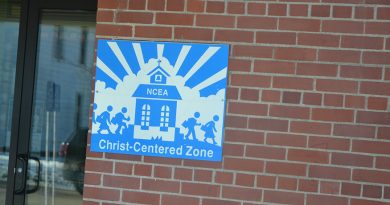Faithful citizenship: looking at this election and beyond
By Mark Schmidt
Special to The Witness
“I’ll be glad when this election is over!”
After a long presidential race it makes sense that we are ready for it to be over. After the continuous barrage of political ads, debates, flyers in the mail, phone calls at suppertime, candidate forums and kitchen table discussions, we are worn out. We want to take a break from “politics.” So we go to the polls, we cast our vote and we call it a day. Or maybe we have become so exhausted and disillusioned that we stay home for election day, turn off the television and resign ourselves to whatever the outcome will be because we are just too tired.
As Catholics, however, we must resist this temptation. Our obligation to our neighbor and to ourselves asks more of us as citizens of this nation and as members of the Church of Christ. As Catholics we have a moral obligation to participate in politics, the organizing and building of a more just society.
“People in every nation enhance the social dimension of their lives by acting as committed and responsible citizens. … Let us not forget that “responsible citizenship is a virtue, and participation in political life is a moral obligation.” (Pope Francis, Evangelii Gaudium [EG], 220)
One of those obligations is to vote. Unfortunately, we regularly find that the candidates on the ballot often promote grave intrinsic evils.
“Catholics often face difficult choices about how to vote … A Catholic cannot vote for a candidate who favors a policy promoting an intrinsically evil act, such as abortion, euthanasia, assisted suicide, deliberately subjecting workers or the poor to subhuman living conditions, redefining marriage in ways that violate its essential meaning, or racist behavior, if the voter’s intent is to support that position. In such cases, a Catholic would be guilty of formal cooperation in grave evil. At the same time, a voter should not use a candidate’s opposition to an intrinsic evil to justify indifference or inattentiveness to other important moral issues involving human life and dignity.” (Forming Consciences for Faithful Citizenship [FCFC], 34)
The bishops also remind us that we have an obligation to promote the good as much as we do to oppose intrinsic evils. Quoting Pope Saint John Paul II, the bishops write:
“As St. John Paul II said, ‘The fact that only the negative commandments oblige always and under all circumstances does not mean that in the moral life prohibitions are more important than the obligation to do good indicated by the positive commandment.’ (Veritatis Splendor, 52)Both opposing evil and doing good are essential obligations. The moral imperative to respond to the needs of our neighbors—basic needs such as food, shelter, health care, education and meaningful work—is universally binding on our consciences and may be legitimately fulfilled by a variety of means.” (FCFC, 24,25)
So what if both candidates support grave intrinsic evils, especially those related to the dignity of the human person and the common good? What are we to do? The bishops offer the following:
“When all candidates hold a position that promotes an intrinsically evil act, the conscientious voter faces a dilemma. The voter may decide to take the extraordinary step of not voting for any candidate or, after careful deliberation, may decide to vote for the candidate deemed less likely to advance such a morally flawed position and more likely to pursue other authentic human goods.” (FCFC, 36)
Even after we have voted, our responsibility as citizens and as Catholics does not end there.
In addition to voting, the church encourages those who may be called to run for political office and to take on such a responsibility as a vocational call. “Politics, though often denigrated, remains a lofty vocation and one of the highest forms of charity, inasmuch as it seeks the common good.” (EG, 205) The lay faithful may also get involved in organizing around a particular issue of justice; contacting legislators and government officials on legislation being enacted to advocate for policies to be morally just; join or start social justice committees at their parish.
The church also permits, when the situation arises, peaceful, non-violent demonstrations or marches to bring attention to issues of injustice such as the March for Life or a workers’ strike. Catholics are encouraged to be creative in developing new strategies that are in congruence with the church’s social and moral teachings to help build a more just and peaceful world.
We must keep in mind that we will never make the world perfect but the benefit of our Catholic faith is that we remain hopeful even in the midst of division, hatred, violence and difficulty. This is because we do not put our faith in any particular candidate, political program, party, faction or ideology. Our faith is in Jesus Christ. So we remember that although we may put trust in those elected to government office he is the only Savior we have. We know that while we strive to bring the world closer to peace and justice through our civic engagement no one but Jesus Christ can truly save us.
To study this topic in greater detail and to read the whole document “Forming Consciences for Faithful Citizenship”, written by the USCCB, go to dbqarch.org/faithfulcitizenship.
Schmidt is the director of the Office of Respect Life and Social Justice for the archdiocese.




